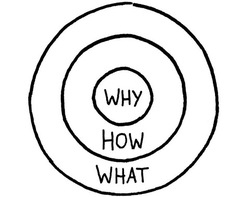
It's fascinating to learn about why we make the decisions that we do (hint: they aren't as rational as you might think), but even more pertinent to the business person hoping to entice a potential customer to buy a product. Simon Senek came up with the idea of the golden circle, and it applies to your company, according to the guys over at Human Design, John Weiss and Matt Null. They did us the favor of presenting on the subject of design at the Startup Bootcamp at SXSW Eco back in October.
The golden circle is this idea that most companies start with the what "we have widgets", move to the how "we make our widgets with superior features", then skim over the why "you should buy them". According to Simon, starting with the "why" and moving to "what" will deliver superior results every time. Appealing to your customers' beliefs then explaining the product benefits encourages them to rationalize the purchase for themselves.
John and Matt emphasized storytelling, and the idea that design is a conversation. What is the story of your organization, and how should you tell it? You should communicate in terms of identity and who your customers want to be.
The golden circle is this idea that most companies start with the what "we have widgets", move to the how "we make our widgets with superior features", then skim over the why "you should buy them". According to Simon, starting with the "why" and moving to "what" will deliver superior results every time. Appealing to your customers' beliefs then explaining the product benefits encourages them to rationalize the purchase for themselves.
John and Matt emphasized storytelling, and the idea that design is a conversation. What is the story of your organization, and how should you tell it? You should communicate in terms of identity and who your customers want to be.
 RSS Feed
RSS Feed
